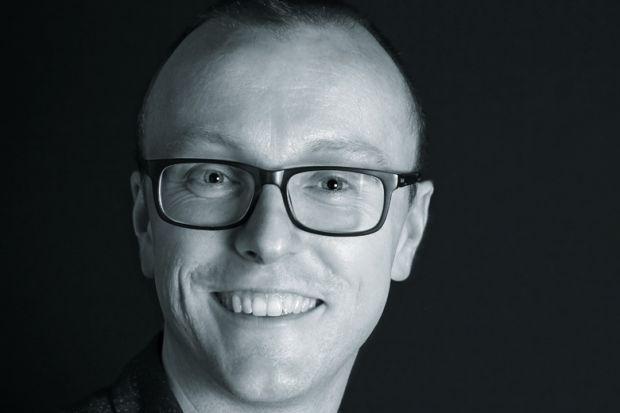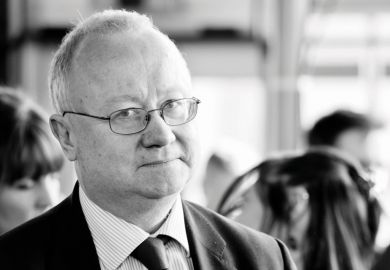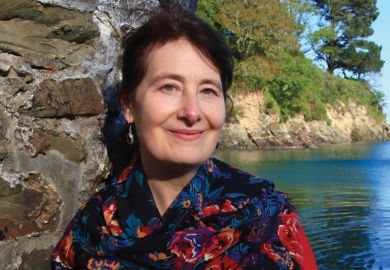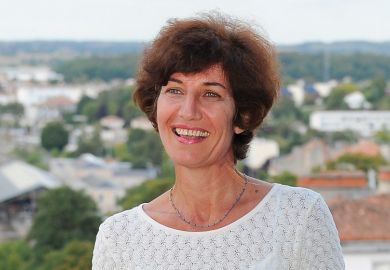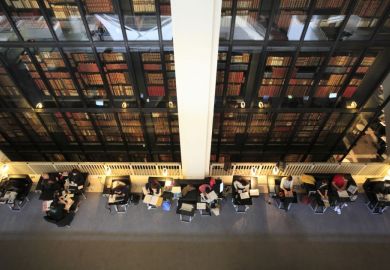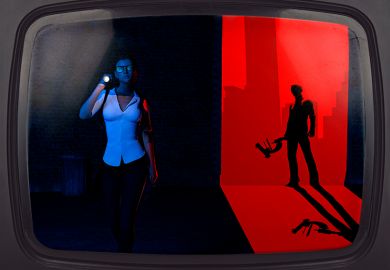Liam Sinclair is the executive producer for Scottish Dance Theatre, Scotland's principal contemporary dance company. Previously, he was director of the annual Edinburgh Mela Festival, a major fixture in the Edinburgh Festival, for three years. In October, he takes up the position of artistic director at the Byre Theatre, part of the University of St Andrews.
Where were you born?
Edinburgh, Scotland.
How has this shaped you?
Edinburgh is the world’s leading festivals city. The abundance of world-class culture throughout the year, but particularly in August, has been instrumental in shaping my passion for the arts.
What do you hope to achieve in your new role?
To reshape the artistic direction of the Byre in a way that makes the most of its long and important heritage, while capitalising on the new opportunities associated with the university running it, specifically the world-class research excellence.
Creative fields are often sidelined in higher education. What does St Andrews’ running of the Byre represent to promoting arts in the academy?
My impression is that St Andrews really values the arts and culture, and this was key in its decision to run the Byre Theatre – creating multiple opportunities for student and staff engagement. What universities and the arts have in common is that they thrive on strong ideas and creativity.
The Byre is an important part of the East Fife local community. How important is a university’s civic engagement?
I think that it is vital. The relationship between the university, theatre and the local community will be built on the engagement with the artistic programme. I see a central aspect of my role as shaping a programme that connects individuals and communities and [it is] important that I form strong working relationships with all [involved]. I’m interested in people and the differences they bring, so I enjoy this part of my work.
How damaging is the continued squeeze on arts funding to the UK’s clout in the global artistic world?
We have been hugely lucky in Scotland, to date, to have most of our arts budgets protected. The Scottish government understands and values the role of arts and culture in society and on the international stage, and has really strived to ensure that funding is protected during these challenging times.
What do you hope that this position will do for your interaction with higher education?
I hope to come into contact with a whole host of interesting people and ideas that can stimulate artists and creative processes. I'm trying to begin this journey [in a] very open-minded [way] so that I don't close off interesting possibilities that may not necessarily come to mind at first. I'm naturally curious so I will enjoy investigating.
The Edinburgh Festival has a global reputation. Does Scotland punch above its weight in artistic output?
Our artistic output is second to none for a small nation and on a world-class level for any nation. Our reputation is totally justified.
Given some of its artistic alumni, how do you think St Andrews compares with other universities for its artistic output?
Really well. I think that it values the arts and that shows in the alumni and activity within the university and the town.
What has changed most in higher education in the past 10 years?
Like most sectors, the impact of fast-moving international markets and technology has been significant. For universities, the experience of the (international) student is vital and the arts can have an important part to play in that. The arts can connect, share and celebrate the diversity of cultures, while creating lots of opportunities for students to get involved through the various societies, not to mention as audience members.
Tell us about someone you admire.
I was lucky to have the chance to work closely with Faith Liddell during her time as director of Festivals Edinburgh, the umbrella body for Edinburgh’s festivals. A truly inspirational leader in the arts, and great company, too.
What advice would you give to your younger self?
Take that gap year and travel the world. I have done a fair amount of travel through work and for leisure, but wish that I’d done more sooner.
What are the best and worst things about your job?
A lack of resources. Wonders are usually done without them but wouldn’t it be amazing if there were more?
What keeps you awake at night?
That human beings (generally) are not as ecologically aware as they might be. I wonder if we are hurtling towards a point where our planet changes drastically forever.
What do you do for fun?
A long walk in the hills or socialising with friends and family.
What’s your biggest regret?
I try not to hold on to regrets but see travel advice for my younger self.
What kind of undergraduate were you?
Enterprising, energetic, social and maybe a little opinionated?!
What’s your most memorable moment at university?
Performing a show at the International Students Theatre Festival in Amsterdam. The show explored the inhumanity that human beings can express towards each other and included a section around the repeal of Section 28/Section 2A [which prohibited local authorities from “promoting” homosexuality] within the Local Government Act. On the day we performed, the act was repealed by the Scottish government and it was a moment of real celebration.
Have you ever had a eureka moment?
All the time. The creative process thrives on them.
What one thing would improve your working week?
If 24 hours could become 48 hours.
If you were higher education minister for a day, what policy would you introduce?
[I'd recommend] that arts curriculum units be woven into all academic disciplines. Imagine the possibilities.
Appointments
Catherine Harper has been appointed deputy vice-chancellor of the University of Chichester. Professor Harper, who is dean of the Faculty of Creative and Cultural Industries at the University of Portsmouth, will take up her position in November. She has previously held senior positions at the universities of East London and Brighton. “I am delighted to be joining the University of Chichester, and I’m especially drawn to the institution’s mixture of an enviable and well-understood history, and the development of modern, innovative and specialist facilities that include the engineering and digital technology park that will showcase the very best of applied design, STEM, and creative technologies,” Professor Harper said.
Bryn Jones has taken up the newly created position of deputy vice-principal at Heriot-Watt University’s Dubai campus. Professor Jones will manage in-country academic activities, ensure the quality of the student experience and work to support recruitment, planning and service provision at the campus. He will also oversee quality assurance and develop external networks. Previously, he was dean of postgraduate studies in the Faculty of Science, Agriculture and Engineering at Newcastle University. “I look forward to working with colleagues from across Heriot-Watt,” he said.
Gerard Lemos has been nominated to become the University of York’s chair of council from August 2017. He joined the council as a lay member last month and will take over as chair subject to election by the council.
Beverley Milton-Edwards of Queen’s University Belfast has been awarded a visiting fellowship at The Brookings Institution, a thinktank.
The University of East Anglia has announced three senior appointments. Gerard Parr has been made head of the School of Computing Sciences, Jonathan Dickens has been appointed head of the School of Social Work and Richard Andrews has joined as head of the School of Education and Lifelong Learning.
POSTSCRIPT:
Print headline: HE & me
Register to continue
Why register?
- Registration is free and only takes a moment
- Once registered, you can read 3 articles a month
- Sign up for our newsletter
Subscribe
Or subscribe for unlimited access to:
- Unlimited access to news, views, insights & reviews
- Digital editions
- Digital access to THE’s university and college rankings analysis
Already registered or a current subscriber?
